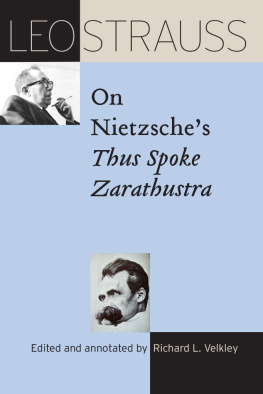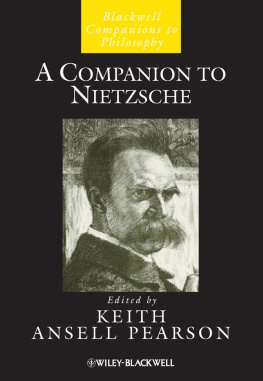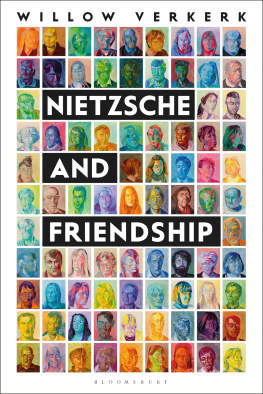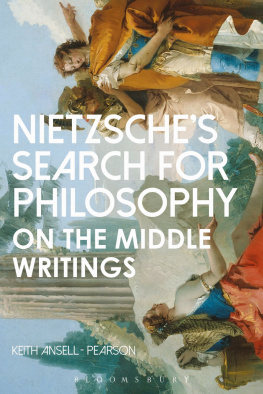Lemm - Nietzsches Animal Philosophy
Here you can read online Lemm - Nietzsches Animal Philosophy full text of the book (entire story) in english for free. Download pdf and epub, get meaning, cover and reviews about this ebook. year: 2009, publisher: Fordham University Press, genre: Religion. Description of the work, (preface) as well as reviews are available. Best literature library LitArk.com created for fans of good reading and offers a wide selection of genres:
Romance novel
Science fiction
Adventure
Detective
Science
History
Home and family
Prose
Art
Politics
Computer
Non-fiction
Religion
Business
Children
Humor
Choose a favorite category and find really read worthwhile books. Enjoy immersion in the world of imagination, feel the emotions of the characters or learn something new for yourself, make an fascinating discovery.

Nietzsches Animal Philosophy: summary, description and annotation
We offer to read an annotation, description, summary or preface (depends on what the author of the book "Nietzsches Animal Philosophy" wrote himself). If you haven't found the necessary information about the book — write in the comments, we will try to find it.
Lemm: author's other books
Who wrote Nietzsches Animal Philosophy? Find out the surname, the name of the author of the book and a list of all author's works by series.
Nietzsches Animal Philosophy — read online for free the complete book (whole text) full work
Below is the text of the book, divided by pages. System saving the place of the last page read, allows you to conveniently read the book "Nietzsches Animal Philosophy" online for free, without having to search again every time where you left off. Put a bookmark, and you can go to the page where you finished reading at any time.
Font size:
Interval:
Bookmark:
Nietzsches Animal Philosophy
Series Board
James Bernauer
Drucilla Cornell
Thomas R. Flynn
Kevin Hart
Richard Kearney
Jean-Luc Marion
Adriaan Peperzak
Thomas Sheehan
Hent de Vries
Merold Westphal
Edith Wyschogrod
Michael Zimmerman
John D. Caputo, series editor

VANESSA LEMM
Culture, Politics, and the Animality of the Human Being

Copyright 2009 Fordham University Press
All rights reserved. No part of this publication may be reproduced, stored in a retrieval system, or transmitted in any form or by any meanselectronic, mechanical, photocopy, recording, or any otherexcept for brief quotations in printed reviews, without the prior permission of the publisher.
Fordham University Press has no responsibility for the persistence or accuracy of URLs for external or third-party Internet websites referred to in this publication and does not guarantee that any content on such websites is, or will remain, accurate or appropriate.
Library of Congress Cataloging-in-Publication Data
Lemm, Vanessa.
Nietzsches animal philosophy : culture, politics, and the animality of the human
being / Vanessa Lemm.
p. cm.
Includes bibliographical references and index.
ISBN 978-0-8232-3027-3 (cloth : alk. paper)
ISBN 978-0-8232-3028-0 (pbk. : alk. paper)
1. Nietzsche, Friedrich Wilhelm, 18441900. 2. Philosophical anthropology.
3. Animals (Philosophy) I. Title.
B3317.L433 2009
128dc22
2008047375
Printed in the United States of America
11 10 09 5 4 3 2 1
First edition
To Lou, Esteban, Aliz, and Miguel
Before all and most of all I am greatly indebted to my husband, colleague, and friend, Miguel Vatter, for his careful and timely reading of the various versions of the book manuscript in its entirety and for challenging me with his criticisms throughout the writing process. My special gratitude to Wendy Brown, Robert Gooding-Williams, Christoph Menke, and Samuel Weber for engaging one or more chapters as well as for their encouragement at various stages of this project. Two anonymous reviewers read the entire manuscript in draft, and their comments and suggestions for improvement were most valuable in the final revision of the manuscript.
Earlier versions of several parts of this book were generously engaged by audiences in a number of seminars, conferences, and workshops. I am especially thankful to the participants of the following three venues: The Political Theory Colloquium in the Political Science Department of Johann Wolfgang Goethe-Universitt Frankfurt, directed by Rainer Forst, which critically engaged my approach to biopolitics through a treatment of the question of animal life in Nietzsche; the Nietzsche in New York Workshop in the Philosophy Department of Hunter College, City University of New York, held by Christa D. Acampora, which offered new perspectives on my reading of On the Genealogy of Morals; and the Nietzsche Research Center (Nietzsche Seminar Group) meeting in the Faculty of Philosophy of the University of Leiden, directed by Paul von Tongeren .
I thank Helen Tartar, editorial director of Fordham University Press, for her advice and support during the publication of this book. I treasure having had the opportunity to work with her. Finally, I am grateful to my sweet children, Lou, Esteban, and Aliz, for their extraordinary patience and infinite generosity. I was most fortunate to have had their company while working on this project. This book is dedicated to them and to my husband.
Institutional support for this project came from the School of Political Science and the Institute of Humanities of the Universidad Diego Portales, Santiago de Chile. I was a recipient of a Fondecyt-Regular research project (Project No 1085238) that allowed me to finance the final stages of this project.
Permission to reprint material published elsewhere has been granted as follows: Justice and Gift-Giving in Thus Spoke Zarathustra in Before Sunrise: Essays on Thus Spoke Zarathustra, James Luchte, ed., London: Continuum International Publishers, 2008: 165181, revised for a small portion of .
References to Nietzsches unpublished writings are standardized, whenever possible, to refer to the most accessible edition of Nietzsches notebooks and publications, Kritische Studienausgabe (KSA), compiled under the general editorship of Giorgio Colli and Mazzino Montinari. References to the editions of letters, Smtliche Briefe: Kritische Studienausgabe, are cited as KSB. In the cases in which the KSA are cited, references provide the volume number followed by the relevant fragment number and any relevant aphorism (e.g., KSA 10:12[1].37 refers to volume 10 fragment 12[1] aphorism 37). The following abbreviations are used for citations of Nietzsches writings:
A | The Antichrist |
AOM | Assorted Opinions and Maxims (HH, vol. II, part 1) |
BGE | Beyond Good and Evil |
BT | The Birth of Tragedy |
CW | The Case of Wagner |
D | Daybreak (alternately: Dawn) |
DS | David Strauss, the Writer and the Confessor (UM I) |
EH | Ecce Homo (sections abbreviated Wise, Clever, Books, Destiny; abbreviations for titles discussed in Books are indicated instead of Books where relevant) |
FEI | On the Future of Our Educational Institutions (KSA 1) |
GM | On the Genealogy of Morals |
GS | The Gay Science |
GSt | The Greek State (KSA 1) |
HC | Homers Contest (alternately: Homer on Competition) (KSA 1) |
HH | Human, All Too Human (two volumes, I and II) |
HL | On the Use and Disadvantage of History for Life (UM II) |
KSA | Kritische Studienausgabe |
KSB | Smtliche Briefe: Kritische Studienausgabe |
P | The Philosopher. Reflections on the Struggle between Art and Knowledge |
PT | Philosophy and Truth |
PTA | Philosophy in the Tragic Age of the Greeks (KSA 1) |
PW | On the Pathos of Truth (KSA 1) |
SE | Schopenhauer as Educator (UM III) |
TI | Twilight of the Idols (sections abbreviated Maxims, Socrates, Reason, World, Morality, Errors, Improvers, Germans, Skirmishes, Ancients, Hammer) |
Font size:
Interval:
Bookmark:
Similar books «Nietzsches Animal Philosophy»
Look at similar books to Nietzsches Animal Philosophy. We have selected literature similar in name and meaning in the hope of providing readers with more options to find new, interesting, not yet read works.
Discussion, reviews of the book Nietzsches Animal Philosophy and just readers' own opinions. Leave your comments, write what you think about the work, its meaning or the main characters. Specify what exactly you liked and what you didn't like, and why you think so.











